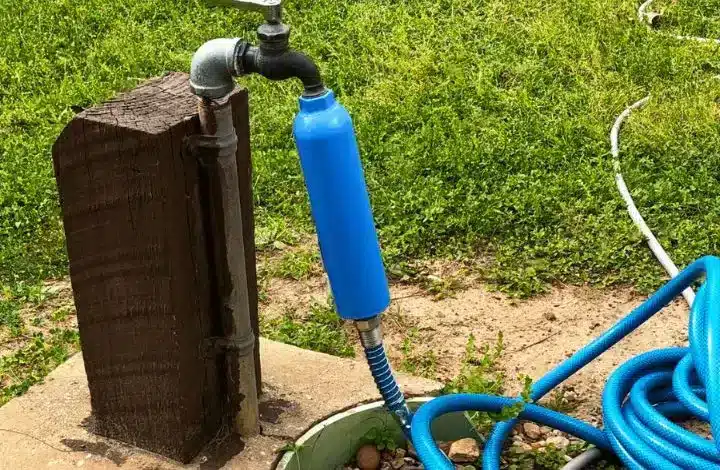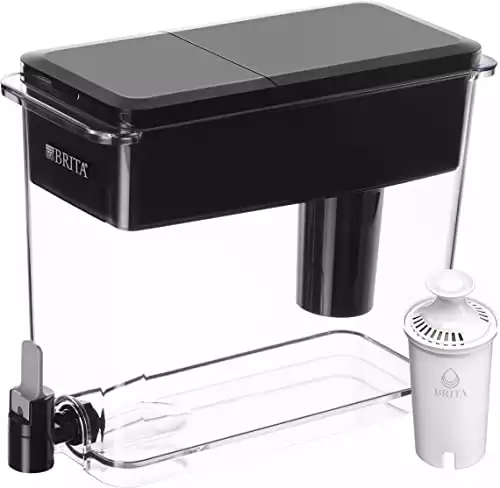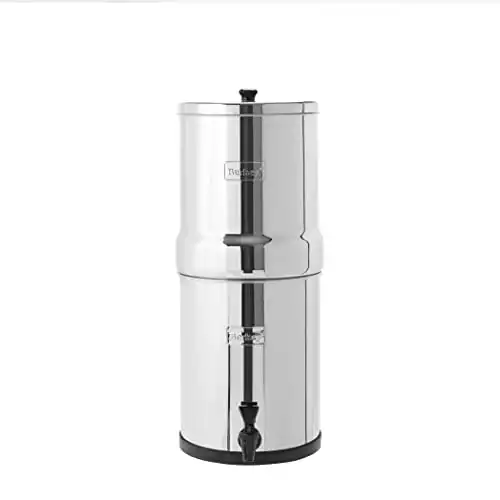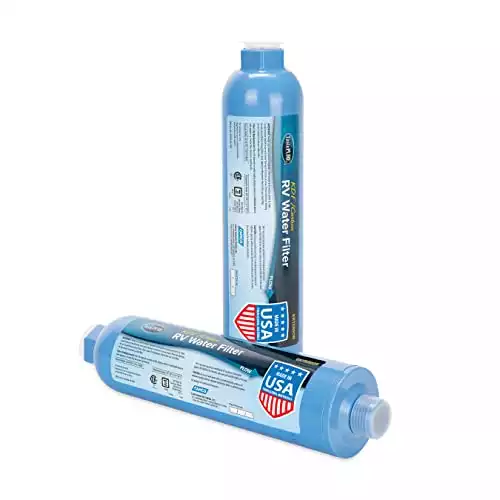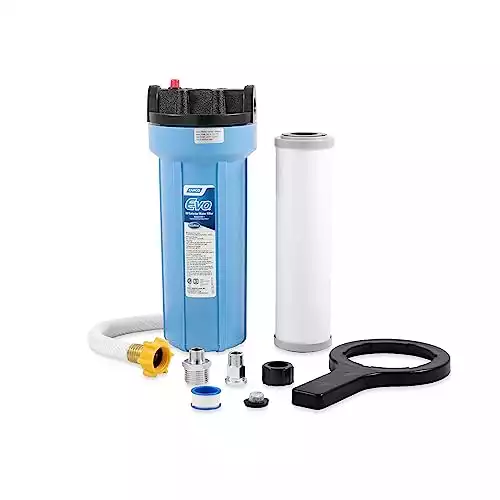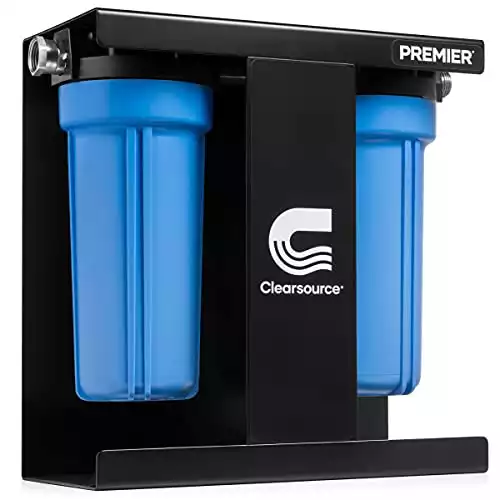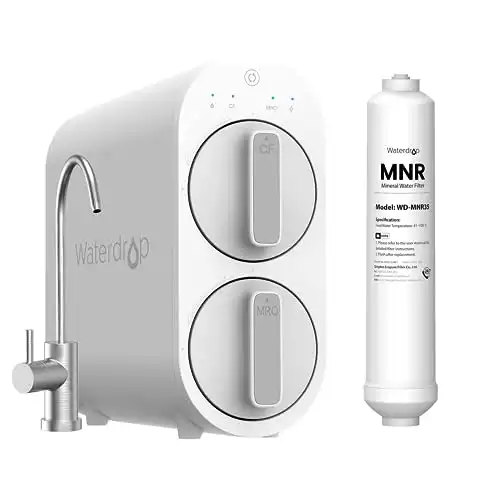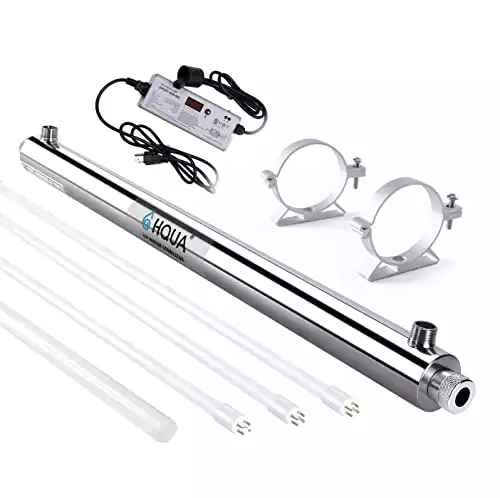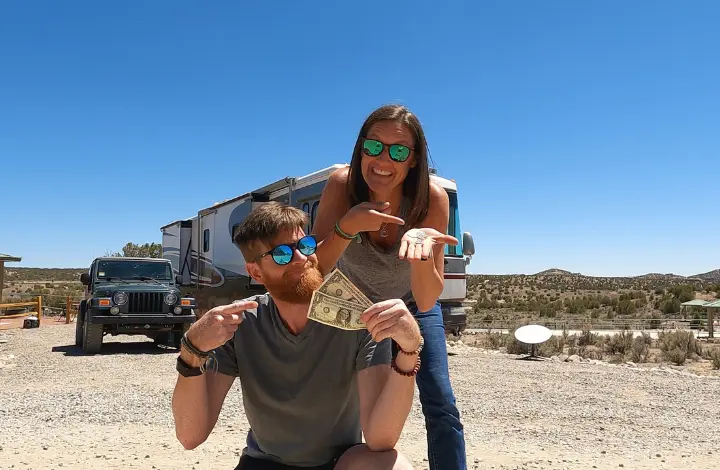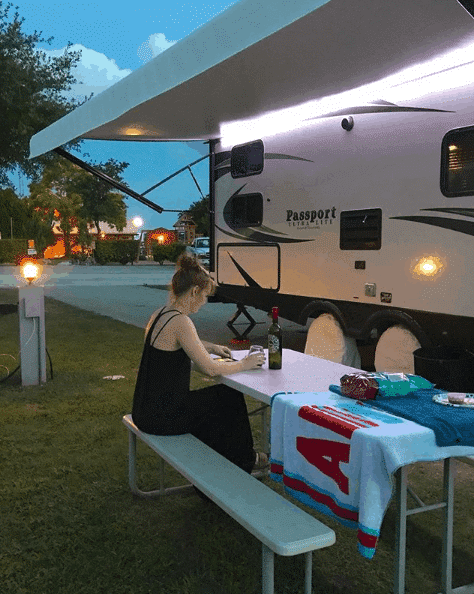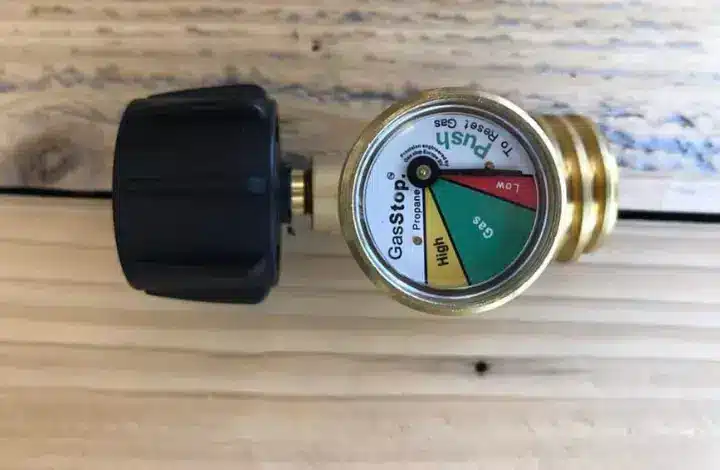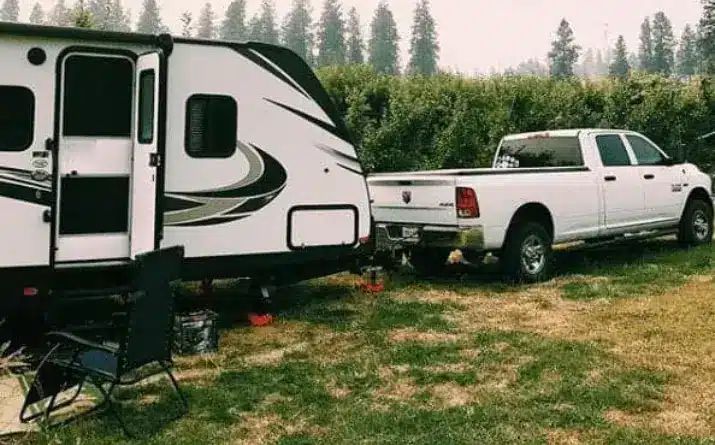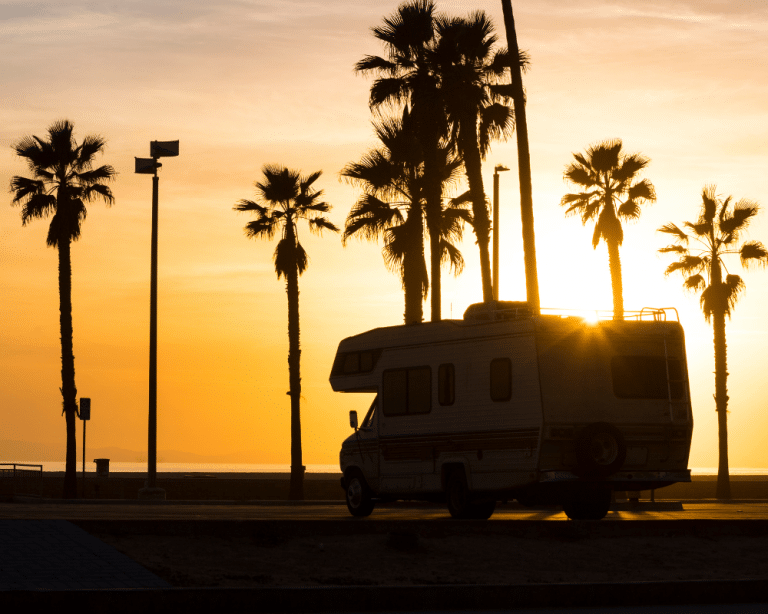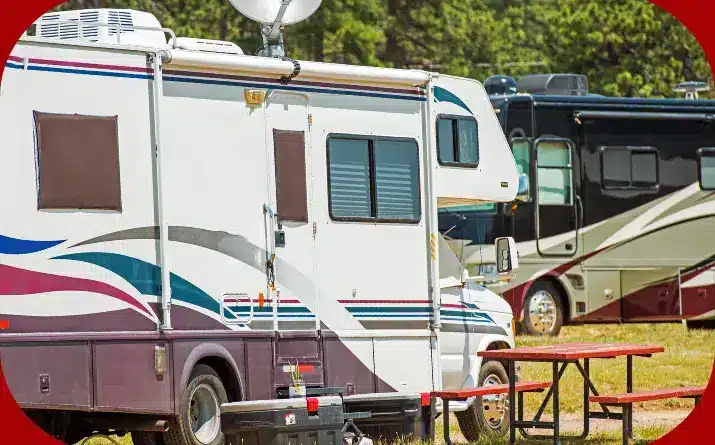RV Water Filtration System Review: Your Best Options
Water is an essential element that every human and animal (and RVer) needs to survive. But not all water is necessarily safe to drink. Which means this exploration of RV water filtration can affect your health while you’re on the road. So please pay attention…
Below, we will cover what “drinkable” water is, common issues you may run into, and how filtration can help create consistent quality drinking water on those long RV trips. And yes, it’s just as important even if you are just a weekend camper.
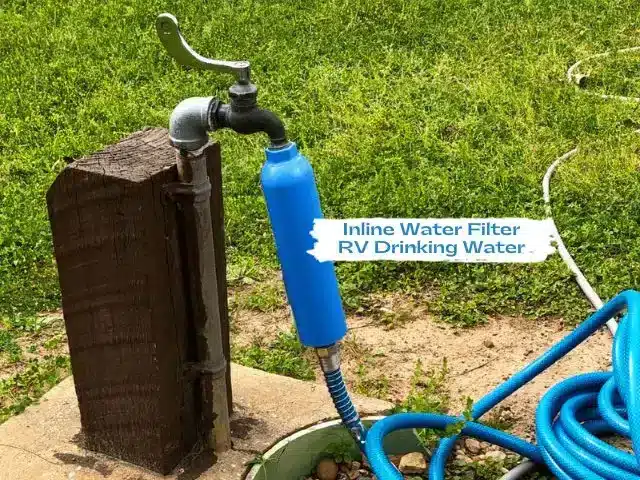
RV Drinking Water Overview
Water is by far the most unique substance on earth. Not only can water exist as a solid, liquid, or gas, it can change from one state to another. From a solid to a liquid, or from liquid to a gas. Uniquely, it can also change from a solid to a gas, known as sublimation.
Most importantly, water is the one element that is essential to all living creatures.
But of course, not all water is clean water. It’s not all potable, or clean enough to drink. No matter how much water you have access to, you need to ensure what you consume is pure water.
The World Health Organization (WHO) defines drinking water (or potable water) as “water that does not represent any significant risk to health over a lifetime of consumption, including different sensitivities that may occur between life stages”.
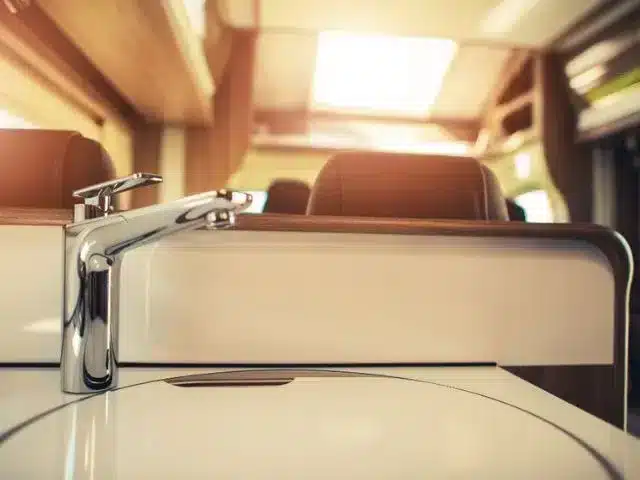
The WHO releases water quality guidelines, but the standards regarding what is considered clean enough to drink vary from country to country. In the United States, the Environmental Protection Agency (EPA) governs the standards for ground water and drinking water.
Chances are if you access city water, or another source from your local municipality, you receive a yearly report on water quality. It typically reports the different levels of metals or metalloids, bacteria, viruses, chemicals, minerals, sediments, and other contaminants.
Whether or not you even read such a report, it’s a good habit to take precautions to ensure that your water is safe to drink.
When you’re traveling across the country, it would be impossible to research every local water source and still have time to enjoy your adventures. Accordingly, it’s particularly important that your RV lifestyle incorporates the best water filters you can find.
Drinkable…But Not Desirable
During your RV travels, you’ll find and access many different water sources. Most campgrounds are either supplied from a municipality or a well. The water flow and water pressure will be different at each location.
Moreover, do not expect the water quality to be consistent in either cleanliness or taste.
Water quality differs across the U.S. for many varied reasons. Water in Arizona, for example, tends to be hard due to the large deposits of magnesium and calcium in the area. Florida water might have a rotten egg smell due to the higher concentrations of hydrogen sulfide in the water supply. Water in certain parts of Massachusetts is known to have higher fluoride levels.
Aside from the potential bad taste, your body may not be ready to consume such a variety or concentration of minerals. The result may be a less than desirable travel experience.
Having consistently high-quality water for your RV use can be a key factor in making your trips as enjoyable as possible.
It can also prevent unwanted illnesses, stomach issues, or even simply “bad” tasting water.
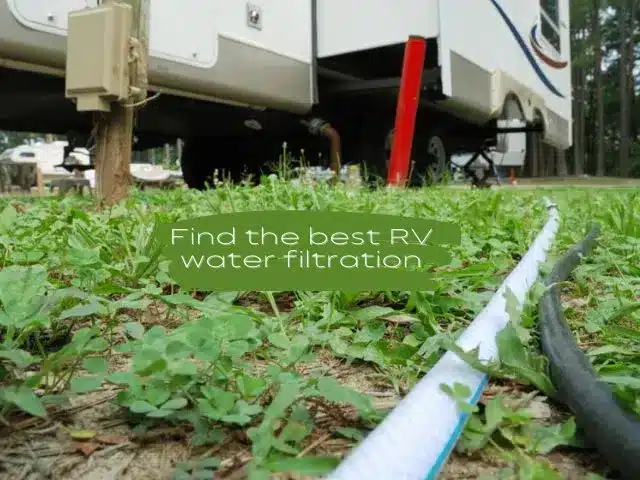
Best RV Water Filter Options
An RV water filter system is a great way to ensure you will have similar great-tasting water and high quality no matter where your travels take you. You won’t be surprised to learn there are many different types of water filters. Filtration options are available in many sizes, shapes, and price points for RVs.
I will cover many types of RV water filters, from a simple inline filter to the most advanced and expensive systems, and many of the options in between.
Countertop Water Filters
If you are like us, having an elaborate water filtration system may not be first on your RV upgrade list.
BRITA WATER FILTER
For us, a common Brita Water Filter pitcher found at any big box store has been at great place to start.
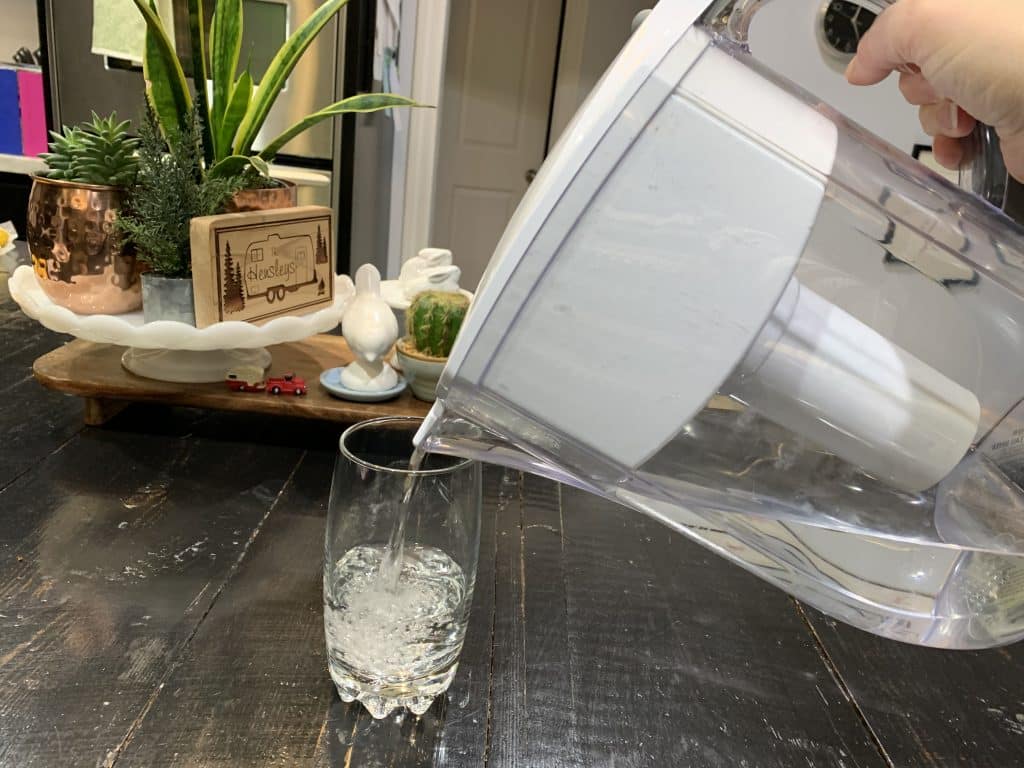
If you have a larger size refrigerator in your RV, a Brita water dispenser may be the best choice in terms of ease of use and convenience.
Reduces chlorine, Mercury, and Copper.
Brita filters use carbon and a type of ion exchanging resin to filter out mercury, chlorine, zinc, copper, cadmium, lead and other heavy metals.
There are many style of pitchers available in various sizes. While the pitcher takes up precious cabinet space, for us it has been our first step into water filtration.
BERKEY WATER FILTERS
Another portable option, especially if you still own a home or have a home base, is a Berkey countertop water filter. You have probably seen one before since they have an enthusiastic fan base.
Includes two black Berkey filter elements.
FRESH CLEAN TASTING WATER
Berkey buyers rave about the great taste of the filtered water and love their sleek look and polished stainless steel canister. These water filtration systems rely on gravity to pull the water through powerful filters that remove a long list of water contaminants.
Lab tested, Berkey filters trap and effectively reduce the amount of sediment, heavy metals, VOCs, rust, silt, and other material from water. A special Berkey filter can also reduce or remove fluoride.
BERKEY FILTER LIFESPAN
With simple regular cleaning, each Black Berkey filter can have a life of up to 3,000 gallons of water. There are various sizes available. The smallest countertop filter, known as the Travel Berkey, has a 1.5 gallon capacity and filters approximately 2.75 gallons per hour.
The Berkey filtration system is known for consistently providing high quality water. However, as with a Brita pitcher, the Berkey system takes up a lot of space on the countertop. Also, in order to avoid a mess, it would need to be secured before your RV is in motion.
Inline Water Filters
Inline water filters are the most basic water filter that you can find at your local big box store. As the name implies, they go “inline” with your water hose after it leaves the faucet you are connected to.
They usually have a pre-filter used to capture sediment (material floating in the water that you may or may not be able to see), KDF (Kinetic Degradation Fluxion), activated carbon granules, and a post filter.
CAMCO TASTEPURE INLINE WATER FILTER
All of this is usually located in a cylinder shaped rugged housing. The blue Camco TastePURE filter is usually the most popular in my opinion throughout the campground. These filters usually provide a first level of water filtration removing gross sediments and contaminants along with removing lead, chlorine, hydrogen sulfide, mercury, and iron, all while being in a price point that most RVers can easily afford.
Attach to any standard garden hose for cleaner drinking water.
The KDF portion of the filter helps prevent bacterial growth in the filter while the filter is not in use. While being the cheapest option at well under $20 per filter, this is a good first step in providing your RV with quality, drinkable water no matter where you go. It is readily available at many big box stores or RV supply stores in addition to the online options.
Canister Filters
Canister filters provide a higher level of protection than inline filters, but of course at a slightly higher price point. The “canister” refers to the container that the filter sits in. Filters that are available in this category range in size and shape, along with filtering material. In addition, costs can vary widely as well depending on what you need.
CAMCO CANISTER FILTER SYSTEM
Not surprisingly, a good starting point in this category is the Camco EVO Premium line of products. This is a one stage filtration option.
Features granulated activated Carbon and 12" extension hose.
CLEARSOURCE TWO-STAGE FILTER SYSTEM
But if you are looking for a more robust and effective two-stage system, or two filters in line with each other. The ClearSource brand, while considerably more expensive, seems to lead the pack for RVers.
Protects against contaminants & bacteria.
MULTI-STAGE SYSTEM DETAILS
With two-stage filter systems, the first filter is usually filled with a sediment catching material that traps larger pieces of sediment and helps preventing the second filter from clogging.
The second filter is typically comprised of solid carbon filters. This second layer catches lead and other metals, along with bacteria and waterborne organisms such as Giardia.
The carbon filter does the bulk of the work, filtering particles and illness causing bacteria and viruses down to the 0.5 micron size (micron is used to describe the filtering size, meaning 1 millionth of a meter). Some water purification setups can also add a third filter, specializing in removing even more iron, lead and other heavy metals. The setup can also include an anti-scaling filter to remove any hard water issues.
CLEARSOURCE 3-STAGE SYSTEM
ClearSource also offers an upgraded 3-Stage canister water filter system known as the ULTRA RV. It costs a bit more, but it may be the right choice for you if you seek an extra layer of safe water protection.
You can find just about any type of multi-stage filter on Amazon at nearly any price point. Be sure to explore the selection on the marketplace to help find the best choice to suit your personal preference.
Reverse Osmosis Systems
Reverse Osmosis (RO) systems represent the next step up when it comes to water treatment. RO is a process by which water is forced through a semipermeable (passable) membrane to filter out any contaminants. You’ll see this used in certain areas to turn saltwater into fresh drinking water.
Reverse Osmosis systems for RVs usually contain several different filters in addition to the Reverse Osmosis filter. These systems usually include a sediment filter, a carbon block filter of some kind, and the Reverse Osmosis filter.
One downfall of the Reverse Osmosis filter is the fact that the reverse osmosis process strips most of the minerals from the water.
WATERDROP TANKLESS REVERSE OSMOSIS SYSTEM
7-stage tankless design.
Tankless options may be offered with remineralization filters. These are considerably more expensive, but also more compact and suitable for small RV spaces.
To remedy this mineral issue, a fourth filter is added that remineralizes the water. The product is clean, fresh, and quite delightful tasting water. These systems contain a pressured water reservoir to help aid in the RO process, and will require lots of room to be installed.
I should also mention that many of these types of treatment systems require installation of an additional small faucet through through which the RO water is dispensed. Many RO systems include a holding tank so the combined system can take up considerably more space than other water filtration options. That creates a space issue that may make it unfeasible for many RV owners.
Be sure you are clear on how much space your system is going to require before making a purchase and moving forward.
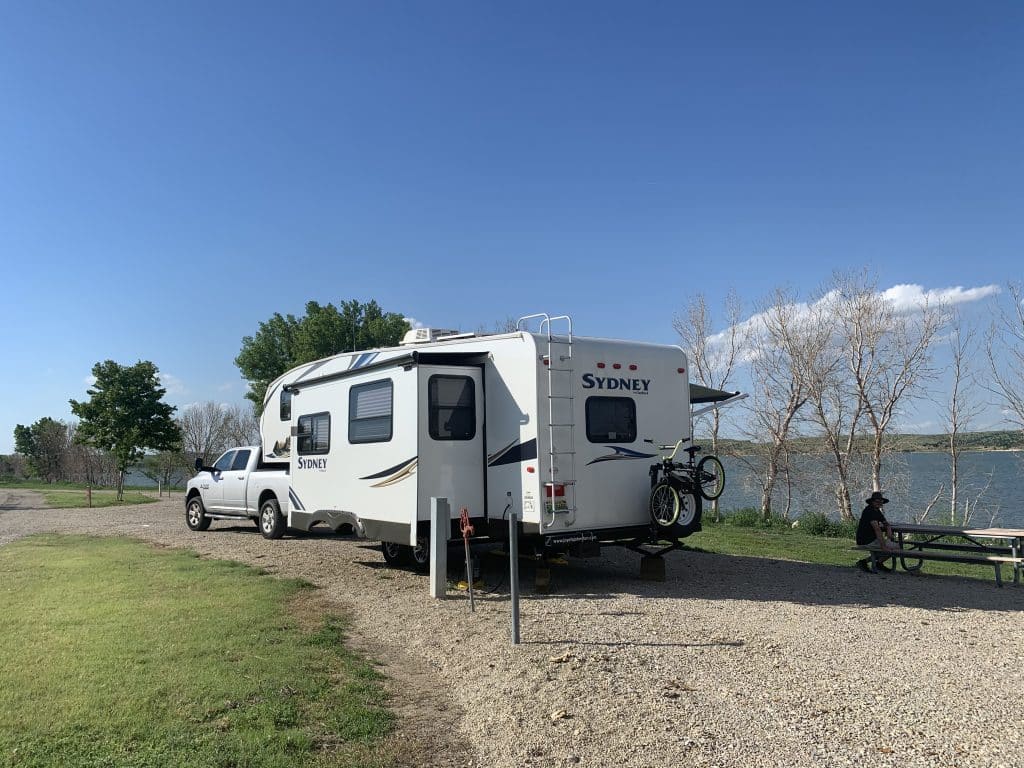
UV Filters and Treatment
Ultraviolet light (UV) is the “cream of the crop” when it comes to RV water treatment. Ultraviolet light is on the electromagnetic spectrum between visible light and X-rays.
UV is used in water filtration systems to kill any and all bacteria and microorganisms. Energy from the UV light penetrates the organism on a cellular level, destroying its ability to grow or killing the organism all together.
This type of filtration system requires either a 12 volt or 120 volt power source to power the UV light.
A sediment filter is placed inline before the UV light source to filter out any large particles that might act as “shadows”. Shadows refer to places where bacteria/other microorganisms could “hide” behind and escape the glow of the UV light. This filter also removes any iron, lead, and other contaminants to help create a better tasting water.
Most RVers install UV filtration systems in the RV kitchen. Many people find space to install them in the cabinet directly underneath the kitchen sink. But obviously, many RVs would not be able to accommodate this size unit.
Acuva sells a great compact unit. Take advantage of the sleek design and hide the system underneath the kitchen cabinet. This might allow you to still have enough space to continue storing other essential items in the cabinet.
Choose the Best RV Water Filtration Option for Your RV Lifestyle
Whether you are a weekender or travel full time, good quality water is a must. Selecting the best RV water filtration option for you may depend on your rig, space available, or simply your desire to have an option that is easily replaceable.
We hope this article has helped you better understand the many different available water filters. I hope you now have the tools to make an informed decision and purchase the best option for your family.
Cheers to safe and great tasting water no matter where you choose to roam.
We’ll see you on the road!
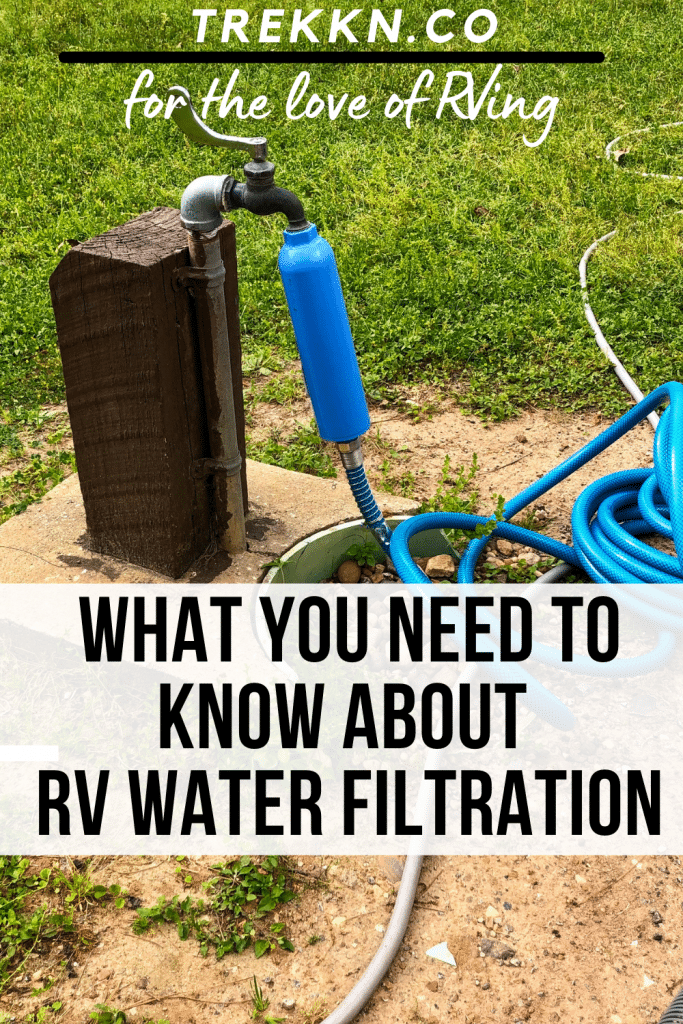
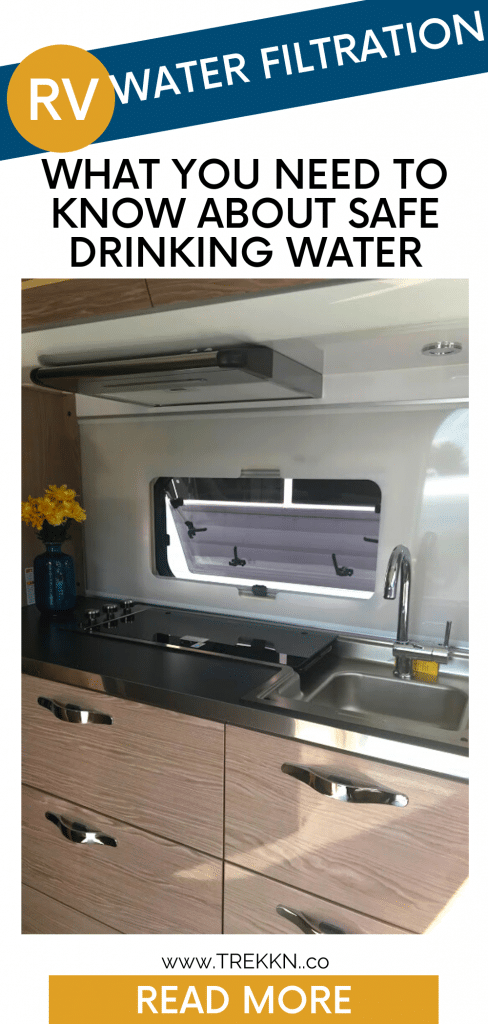

Nick and Kelsey Hensley are part-time RVers and full time adventure seekers. Nick is a Rocket Scientist by day and a Certified RV Technician by night. Kelsey works as a freelancer, photographer and digital ninja. With their two kids, the Hensleys road trip across the country every summer on their quest to see all 63 National Parks. On the weekends you can find this nerdy crew at a campground, historic site, or checking out the newest restaurant in town.


